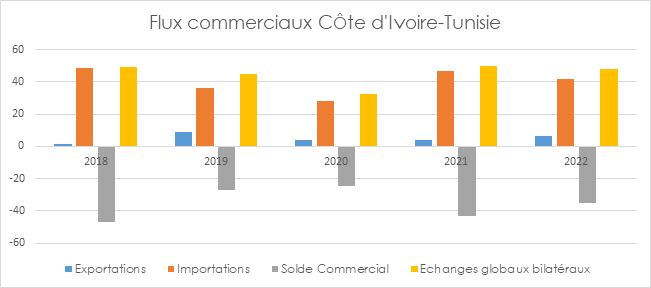Continent: Africa
Official name: Tunisian Republic
Nature of regime: Semi-presidential
Head of Federal State: Kais Saïed
Area: 162,155 km²
Currency: Tunisian Dinar
Population (2022): 12 million inhabitants
Capital: Tunis
Main cities: Tunis, Sfax, Sousse, Gabès, Kairouan, Bizerte
Official language: Arabic
Agreements and Conventions
At the end of the 8th Grand Joint Commission, which took place on the sidelines of the visit of the Head of Government of the Republic of Tunisia, eleven (11) Cooperation Agreements and two (02) Memoranda of Understanding were signed in the following areas:
- Cooperation Agreement in the field of higher education and scientific research;
- Cooperation Agreement in the Social Field;
- Health Agreement;
- Cooperation Agreement in the field of agriculture;
- Fisheries Cooperation Agreement;
- Cooperation agreement in the field of construction and urban planning;
- Agreement in the field of transport;
- Agreement in the field of tourism;
- Cooperation Agreement in the field of ICT;
- Cooperation Agreement in Micro, Small and Medium-sized Enterprises;
- Cooperation Agreement on the Promotion and Development of Handicrafts;
- Memorandum of Understanding on Vocational Training and Employment;
- Memorandum of Understanding on Integrated Management and Development of Wetland and Coastal Resources.
In addition, Cote d’Ivoire and Tunisia signed several Agreements and Conventions from 1965 to 1999, the main ones being:
- Tax Convention signed in Abidjan on May 14, 1999;
- Cultural Convention signed in Tunis on April 26, 1997;
- Cooperation Agreement in the field of Tourism and Handicrafts signed in Tunis in April 1996;
- Agreement on the Reciprocal Promotion and Protection of Investments signed on May 16, 1995, in Abidjan;
- Trade Agreement signed on May 16, 1995 in Abidjan;
- Convention on Judicial Cooperation signed on July 8, 1975, in Tunis;
- Agreement on Air Transport signed on June 8, 1967, in Tunis;
- Consular and Establishment Convention signed on December 2, 1965, in Abidjan.
Within the framework of cultural cooperation agreements, each year, a dozen scholarships are awarded to Ivorian students for the continuation of their university education in higher education institutions in Tunisia.
In addition, military training courses are offered to Cote d’Ivoire as part of capacity building in security, defense and the fight against new security threats.
A. Main Exports of Cote d’Ivoire to Tunisia: Plastics and articles thereof, mineral fuels, mineral oils and products of their distillation; bituminous materials.
B. Main imports from Cote d’Ivoire to Tunisia: Machinery, electrical appliances and equipment and parts thereof; recording apparatus, animal or vegetable fats and oils; products of their dissociation; edible fats.
|
Trade flows Cote d’Ivoire-Tunisia (Value in billions of CFA francs) |
|||||
|
Years |
2018 |
2019 |
2020 |
2021 |
2022 |
|
Exports |
1,4 |
8,7 |
3,9 |
3,7 |
6,5 |
|
Imports |
48,4 |
35,9 |
28,2 |
46,6 |
41,5 |
|
Trade balance |
-47 |
-27,2 |
-24,3 |
-42,9 |
-35 |
|
Global bilateral exchanges |
49,4 |
44,6 |
32,7 |
49,7 |
48 |
Sources : DGE-DPPSE

Sources : DGE-DPCEI
- Cote d’Ivoire trade with Tunisia is irregular, from one year to another from 2018 to 2022, in 2018 they were at 49.4 billion of CFAF and 48 billion of CFAF in 2022.
- Over the period 2018-2022, the average value of Ivorian exports amounted to 4.84 billion of CFAF/year against 40.12 billion of CFAF /year for imports.
- The balance of trade is in deficit for Cote d’Ivoire throughout the period.

